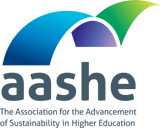
Bellevue College sent a delegation of 9 students to the annual conference for the Association for the Advancement of Sustainability in Higher Education (AASHE) in Portland, Oregon. The AASHE Conference provides faculty, staff, and students with an opportunity to explore the latest opportunities in sustainable operations and strategies for solving wicked problems.
Students took advantage of the wealth of knowledge and networking at the conference. What were some hot topics?
Student Housing. Bellevue College plans on building student housing on-campus, breaking ground in 2016. While housing presents a new opportunity for students, it presents a challenge for monitoring energy, waste, and transportation. Clarkson University in New York presented on strategies for educating on and promoting conservative behavior. Clarkson noted two strategies:
- Identifying “issues that motivate the students to change (climate change, energy independence, etc.), and the use of these motivations for goal setting, and reiteration in weekly messages to the students.”
- Presenting “students with real-time utility use to students through display screens prominently located in the apartment living rooms and a shower orb that provides visual (color) clues in response to shower length. Changes in the student behaviors are measured directly with data from the sensor network and indirectly with pre and post surveys.”
Clarkson’s sustainability team members “hypothesize that to enact widespread and lasting behavior to conserve resources that persists across situations; individuals need to internalize the value, utility, and importance of clean energy behavior in combination with detailed and useful informational feedback.”
Faculty Engagement and Learning. The American Association of Community Colleges presented “Living Lab” resources from the Sustainability Education and Economic Development (SEED) Center. Living Labs are a model for curriculum and sustainability engagement, and rely on using a college’s infrastructure and capitol as learning opportunities for courses. The Living Lab model has been used by college’s to improve conservation efforts while soliciting the knowledge of faculty and students.
“These so-called “living laboratories” merge academics and campus facilities management to provide students with real-world skills and, for the institution, a path to meeting sustainability goals. Launching a living laboratory so that it progresses from a simple single class project to an organizational “way of doing business” is no small feat. Breaking current curricular and operational paradigms like this requires breaking down institutional silos, a supportive culture, and resources. “
Bicycling on Campus. College students use whatever means necessary for getting to class. Bicycling is a cheap, efficient, and green way of getting from A to B. Several sessions focused on how colleges promote cycling and its benefits across the student body.
Successful programs progress multiple priorities of a bicycle community simultaneously in order to yield sustainability and transportation outcomes. This includes maintenance classes, street infrastructure, safety lessons, and access to bicycles.
This is just a taste of the lessons learned from the AASHE Conference 2014. The 9 students from Bellevue College plan to bring their knowledge to the campus through initiating several new programs and bringing new technologies to campus.
Last Updated October 30, 2014
